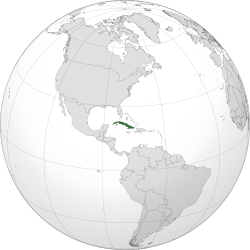
Cuba
Country in the Caribbean / From Wikipedia, the free encyclopedia
Dear Wikiwand AI, let's keep it short by simply answering these key questions:
Can you list the top facts and stats about Cuba?
Summarize this article for a 10 years old
Cuba (/ˈkjuːbə/ ⓘ KEW-bə, Spanish: [ˈkuβa] ⓘ; Lucumi: Erekusú),[13] officially the Republic of Cuba (Spanish: República de Cuba [reˈpuβlika ðe ˈkuβa] ⓘ), is an island country comprising the island of Cuba, as well as Isla de la Juventud and several minor archipelagos, a 4,195 islands and cays surrounding the main island belong to the country. Cuba is located where the northern Caribbean Sea, Gulf of Mexico, and Atlantic Ocean meet. Cuba is located east of the Yucatán Peninsula (Mexico), south of both the American state of Florida and the Bahamas, west of Hispaniola (Haiti/Dominican Republic), and north of both Jamaica and the Cayman Islands. Havana is the largest city and capital; other major cities include Santiago de Cuba and Camagüey. The official area of the Republic of Cuba is 109,884 km2 (42,426 sq mi) (without the territorial waters) but a total of 350,730 km2 (135,420 sq mi) including the exclusive economic zone. Cuba is the second-most populous country in the Caribbean after Haiti, with over 11 million inhabitants.[14]
Republic of Cuba | |
|---|---|
| Motto: ¡Patria o Muerte, Venceremos! ("Homeland or Death, We Shall Overcome!")[1] | |
| Anthem: La Bayamesa ("The Bayamo Song")[2] | |
 Cuba shown in dark green | |
| Capital and largest city | Havana 23°8′N 82°23′W |
| Official languages | Spanish |
| Other spoken languages | Haitian Creole English |
| Ethnic groups (2012)[lower-alpha 1][3] |
|
| Religion (2020)[4] |
|
| Demonym(s) | Cuban |
| Government | Unitary Marxist–Leninist one-party socialist republic[5] |
| Miguel Díaz-Canel | |
| Salvador Valdés Mesa | |
| Manuel Marrero Cruz | |
| Esteban Lazo Hernández | |
| Legislature | National Assembly of People's Power |
| Independence from Spain and the United States | |
| 11 March 1812 10 October 1868 | |
| 24 February 1895 | |
• Recognized (Handed over to the United States from Spain) | 10 December 1898 |
• Republic declared (Independence from United States) | 20 May 1902 |
| 26 July 1953 – 1 January 1959 | |
| 10 April 2019 | |
| Area | |
• Total | 109,884 km2 (42,426 sq mi) (104th) |
• Water (%) | 0 |
| Population | |
• 2023 estimate | 10,985,974[6] (85th) |
• 2022 census | |
• Density | 101.8/km2 (263.7/sq mi) (80th) |
| GDP (PPP) | 2015 estimate |
• Total | $254.865 billion[8] |
• Per capita | $22,237[8][9] |
| GDP (nominal) | 2021 estimate |
• Total | |
• Per capita | |
| Gini (2000) | 38.0[11] medium |
| HDI (2021) | high · 83rd |
| Currency | Cuban peso (CUP) |
| Time zone | UTC−5 (CST) |
| UTC−4 (CDT) | |
| Driving side | right |
| Calling code | +53 |
| ISO 3166 code | CU |
| Internet TLD | .cu |
The territory that is now Cuba was inhabited as early as the 4th millennium BC, with the Guanahatabey and Taíno peoples inhabiting the area at the time of Spanish colonization in the 15th century.[15] From the 15th century, it was a colony of Spain, and slavery was abolished in 1886, remaining a Spanish colony until the Spanish–American War of 1898, when Cuba was occupied by the United States and gained independence in 1902. In 1940, Cuba implemented a new constitution, but mounting political unrest culminated in a coup in 1952 and the subsequent dictatorship of Fulgencio Batista.[16] The Batista government was later overthrown in January 1959 by the 26th of July Movement during the Cuban Revolution. That revolution established communist rule under the leadership of Fidel Castro.[17][18] The country was a point of contention during the Cold War between the Soviet Union and the United States, and a nuclear war nearly broke out during the Cuban Missile Crisis of 1962. Following the collapse of the Soviet Union, Cuba faced a severe economic downturn in the 1990s, known as the Special Period. In 2008, Fidel Castro resigned after 49 years of leadership of Cuba and was replaced by his brother Raúl Castro.
Cuba is one of a few extant Marxist–Leninist one-party socialist states, in which the role of the vanguard Communist Party is enshrined in the Constitution. Cuba has an authoritarian regime where political opposition is not permitted.[19][20] Censorship of information is extensive and independent journalism is repressed in Cuba;[21][22][23] Reporters Without Borders has characterized Cuba as one of the worst countries in the world for press freedom.[24][23]
Culturally, Cuba is considered part of Latin America.[25] It is a multiethnic country whose people, culture and customs derive from diverse origins, including the Taíno Ciboney peoples, the long period of Spanish colonialism, the introduction of enslaved Africans and a close relationship with the Soviet Union during the Cold War.
Cuba is a founding member of the United Nations, G77, Non-Aligned Movement, Organisation of African, Caribbean and Pacific States, ALBA, and Organization of American States. It has currently one of the world's few planned economies, and its economy is dominated by the tourism industry and the exports of skilled labor, sugar, tobacco, and coffee. Cuba has historically—both before and during communist rule—performed better than other countries in the region on several socioeconomic indicators, such as literacy,[26][27] infant mortality and life expectancy. Cuba has a universal health care system which provides free medical treatment to all Cuban citizens.[28][29]

